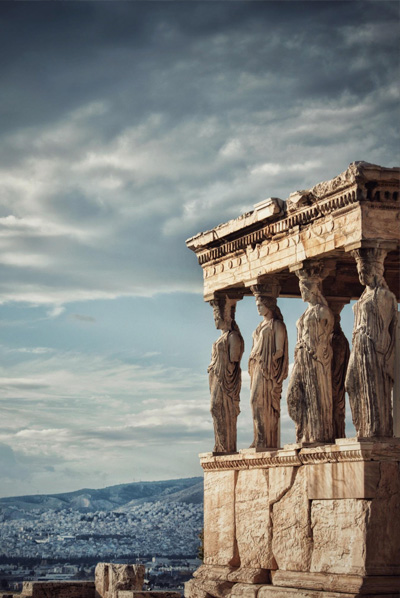Think
On this occasion, we owe the publication to Gabriel Garza, head of essay of the Pensar section, and student of the Degree of History and of the Diploma in Archaeology, as well as of the Degree in Philology Hispánica. The Humanities have always been in the focus of discussion, but now they are under special attack. What do you think? Are they useful, are they worth investing money in?
Humanities. The forgotten thought
Dear BeBrave readers. Today the magazine begins a new stage with new names. We can't think of a better way to celebrate it than dedicating a few brief lines to you from our "Thinking" section, which will be at position by Carlos Poole, Dálida Grassetti, Claudia Aracena, Eva Infante and Gabriel Garza.
Diploma During my years at the university I have seen the great references in the study of Antiquity coming from all corners of Europe, such as Dario Bernal, or Greg Woolf, among many others. In this case, I will rely on the lecture of David Hernandez de la source, Full Professor of Philology Greek at the Complutense University of Madrid, entitled: "The value of the classical heritage in the modern world", and taught in the archaeological seminars of this course. As the Humanities are, precisely, shared words and thoughts, I consider that the accredited specialization of this discussion paper can help me to show you the presence of the classics in many of today's movements.
The Humanities have been considered by many as a sterile discipline . From Ancient Greece, through the Roman Empire, the Age of average or the Enlightenment; in every era there have always been criticisms of its members.
However, nowadays the vindication of Humanities is becoming a very necessary aspect. We find ourselves at a time when ideologies stand out for their constant attacks against the world of Letters, rejected even by those who, when elaborating their speeches, ignore the importance of the parameters established by framework Antonio, by Seneca or by other of the great orators of antiquity. It seems that the Humanities have lost their value, or so they make us believe with questions such as "What are you studying that for?", "What are you going to work on?". We, defenders of human culture, come to show you the reality of our society, so that you can think again in a way that has been forgotten.
During the last century, two important events took place that provoked a desire to return to the past: the revolts of May 68 and 15M. Both protests sought to return to a democracy very similar to the Greek one, but how to return to something we do not know? Citizens sought a freedom and equality that had already reigned in Athens, ignoring that the Athenians legitimized it in tyranny. Leading the Delphic League, all their "allies" became subjects. Of course, the price of freedom was not paid by them, but by the neighboring polis. This small example serves to illustrate the way in which human beings tend to act, regardless of the century in which they find themselves. The next question we could ask ourselves is: does man also think in the same way as before?
The two revolts mentioned above are sample of a countercultural movement that decided to settle in the margins of society. These acts seem to have a certain relationship with intellectual aspects such as cynicism, developed by Diogenes, who defends the return to a simple life and affirms that we have the basic elements to obtain happiness, which must be conquered with our freedom. For its part, stoicism, the great Philosophy of the Roman Empire, preached that problems are disturbances alien to our center, from which we must free ourselves to take control. No doubt, these thoughts can be applied to current concepts; technologies, for example, promise us happiness, but do not give it to us.
 Epicureanism, on the other hand, precedes modernity. It carries out a vision of a godless ethic and promotes a centered way of living, in which everything dissolves: we must live against fear. Epicurus affirms that happiness is within our reach and that we must understand the absurdity of our fears. The only way to knowledge is the sensory way, so we must understand nature and achieve a balance between pleasure and pain. From these ideas arise the well-known clichés of Carpe diem y Aurea mediocritas.
Epicureanism, on the other hand, precedes modernity. It carries out a vision of a godless ethic and promotes a centered way of living, in which everything dissolves: we must live against fear. Epicurus affirms that happiness is within our reach and that we must understand the absurdity of our fears. The only way to knowledge is the sensory way, so we must understand nature and achieve a balance between pleasure and pain. From these ideas arise the well-known clichés of Carpe diem y Aurea mediocritas.
It is not only the philosophical currents that are determinant today; there are various figures such as Aristotle, Pythagoras or Plato, who are also present in our days.
Aristotle is the theoretical founder of many of the specialized sciences, precursor of the scientific and experimental method, and master of individual virtue ethics in the framework of collective virtue. He always affirms that the true path to happiness lies in the realization of our raison d'être. For his part, Pythagoras was the great precursor of what we now call "alternative life". Curiously, he is the one who best symbolizes the challenges facing man today. He conceived the numerical proportion as a principle that orders the entire cosmos, which is closely related to the algorithm in the great network of networks that controls the world today. In addition, his person represents several very current aspects: on the one hand, the alternative life model based on vegetarianism and pacifism (Withdrawal to meat and violence) and, on the other hand, he advocates meditation, music and self-knowledge as ways to improve the individual. Finally, we cannot forget Plato, a character present in any discussion of political events. He is the great catalyst between the world of oratory and writing. In his Philosophy, he develops the conflict between relativism and the moral background and promotes the "common good" instead of the "general interest". He embodies for modern man good administration and individual virtues, harmony in civic life and decisions made for the family and for the good of the community.
As you have been able to observe, classical culture has a great presence in our daily actions and thoughts; however, during the last centuries the human being has developed exponentially in the technological facet. From industrialization to the appearance of computers, all the advances have brought a certain progress in the disciplines... then, shouldn't the Humanities continue accompanying the human being in his life process, why would they now be left behind, if they have shaped for centuries all that we are?
 They have not. In the last decades, a humanistic trend known as "Humanities Digitals" has developed. Some experts consider Father Bucha to be its founder, who, together with business IBM (International Business Machines Corporation), created the Index ThomisticusThe booklet, a table of contents with the texts of St. Thomas Aquinas, is also available. This shows that the Humanities are able to adapt and continue to accompany man, but he must, of necessity, commit himself not to abandon them.
They have not. In the last decades, a humanistic trend known as "Humanities Digitals" has developed. Some experts consider Father Bucha to be its founder, who, together with business IBM (International Business Machines Corporation), created the Index ThomisticusThe booklet, a table of contents with the texts of St. Thomas Aquinas, is also available. This shows that the Humanities are able to adapt and continue to accompany man, but he must, of necessity, commit himself not to abandon them.
Through this intimate and human dialogue that we have begun, we dare to ask you: What do you think, what is the value of Humanities today?
If you liked the article, you might be interested in one of our Degrees!










